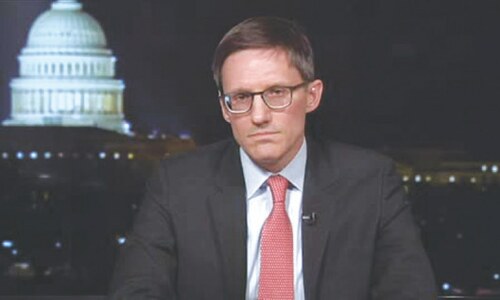EVERY journey begins with a single step. The first that Mao Zedong took in his famous Long March began on Oct 16, 1934. It has not yet reached its destination. China’s progress towards its destiny is still ongoing.
In 1934, Mao and his companions in the Red Army were in retreat, pursued by the Nationalist Army under Chiang Kai-shek. A hundred years later, the Red Army has morphed into the People’s Liberation Army, with an active force of over 2.2 million and 1.2m in reserve.
Today, Chiang Kai-shek’s successors are marooned on the island of Taiwan, protected by 169,000 active military personnel with 1.66m in reserve, its political continuity underwritten by the United States.
In 1985, the defence policy of the People’s Republic of China under Deng Xiaoping changed dramatically. From a strategy to “hit early, strike hard and to fight a nuclear war”, China has “focused on increasing mechanisation and informatisation to be able to fight a high-intensity war”. Aiming at “quality rather than on quantity”, it has reduced its armed forces by over 1m and cut its bloated leadership by 50 per cent.
China has decided that enough is not enough.
Nevertheless, China carries a big stick of 350 nuclear warheads. Pakistan has 165. (Readers should know that one nuclear device can annihilate half a million humans.)
So, why does the stronger China not invade its offshore island of Taiwan and be done with it, as Nehru did with Goa in 1961?
It is clear that China has adopted Winston Churchill’s advice that “Jaw-Jaw is better than War-War”. Ever since the PRC took its seat in the United Nations, ousting Taiwan from the Security Council, it has watched with dismay as the UN has become (to use Mao’s telling phrase) “a running dog” of neo-imperialist Western powers.
While China has often exercised its veto to protect UN member states from the idiocies of the US and its accomplices, it has not been able to make the UN fulfil its role as a peacemaker. The UN’s blue helmets have all too often brought shame, not honour, to its peacekeeping operations, especially in war-torn Africa.
China has decided that enough is not enough. By brokering the recent rapprochement between the Kingdom of Saudi Arabia and the Islamic Republic of Iran, China has taken its first significant step in its Long March as an international peacemaker of the first resort.
It has left the Russians to recall its stale success in brokering the Tashkent Declaration between India and Pakistan in 1966, and its off-stage encouragement of the same parties to sign the now sterile Shimla Agreement of 1972. It has left the US to savour the bitter aftertaste of the accords it brokered in 1978 between Israel and Egypt at Camp David, and the subsequent 1993 Oslo Accords between Israel and the PLO, signed at the White House.
If one peels away the superficial layer of China’s latest diplomatic initiative, what is revealed are two realities.
The first is that such a reconciliation would not have been possible without the will of Crown Prince Mohammed bin Salman. His Gestapo-like treatment of his mega-rich Saudi kinsmen has been forgotten.
His alleged involvement in the murder of his fellow Saudi Jamal Khashoggi has liquefied in the acid of oblivion. The conflict between his Saudi-led coalition and the Houthi rebels in Yemen supported by Iran continues to smoulder. MBS, meanwhile, remains the undisputed ruler of the Crown Princedom of Saudi Arabia.
Iran’s decision to let China act as mediator is a reinforcement of the late Ayatollah Khomeini’s derisive view of the US, as “the great Satan, the wounded snake”. Iran has learned that it owes nothing to its Pahlavi past. It has found its place in the 21st century as an independent nation in the Eastern hemisphere, not an acolyte of a distant US.
Should Pakistan expect its iron brother China to help it resolve its simmering disputes, particularly those with India? In a rational-minded subcontinent, this might have been a possibility. Under Prime Minister Modi’s India and a rudderless coalition-led Pakistan, there is no hope in heaven, and certainly not on earth.
Pakistan’s priorities are not occupied Jammu & Kashmir or the Indus Waters Treaty, nor the rehabilitation of its flood affectees. It prefers to remain in a state at war within itself, a domestic War-War not Jaw-Jaw.
The latest weaponry being deployed by its politicians are the gifts given to our sticky-fingered leaders during their foreign tours. The recent disclosure by the state Toshakhana exposes their unseemly rapacity.
Diamond-studded trinkets and bullet-proof cars were acquired by donees at a fraction of their market price. It is a pity that our leaders should have placed such a similarly low value on their own integrity.
The writer is an author.
www.fsaijazuddin.pk
Published in Dawn, March 16th, 2023
















































Dear visitor, the comments section is undergoing an overhaul and will return soon.